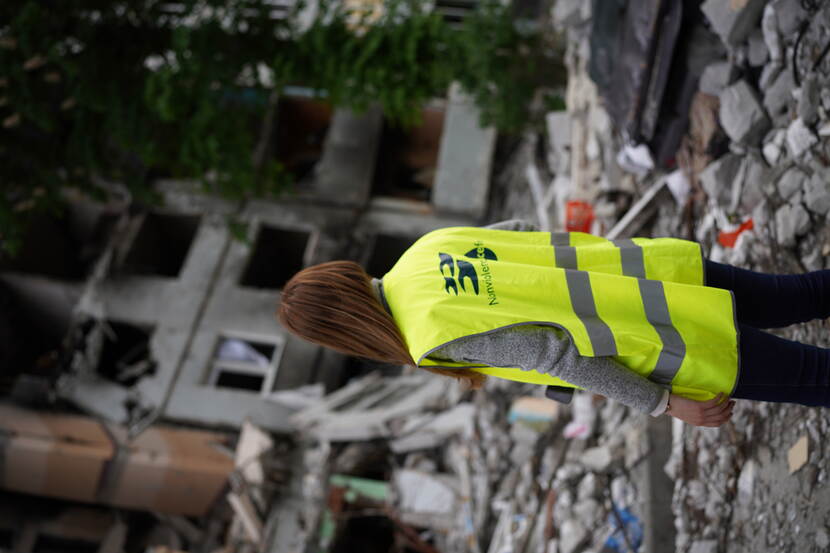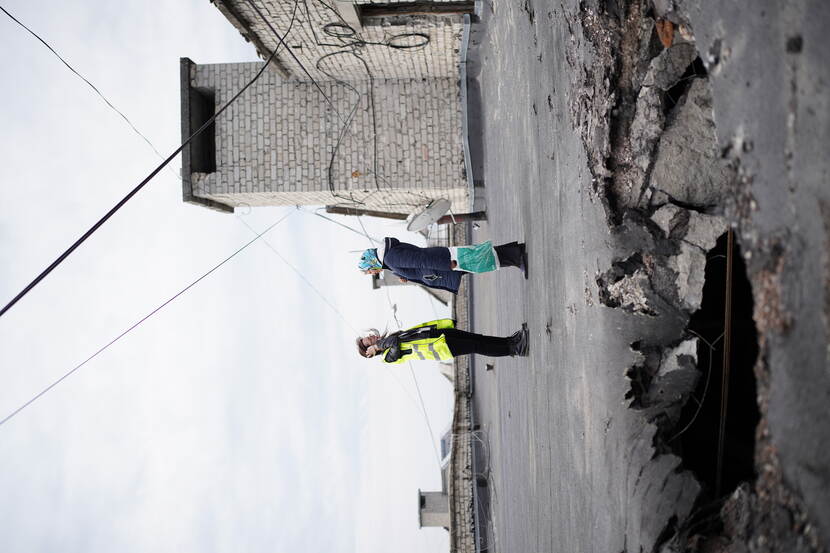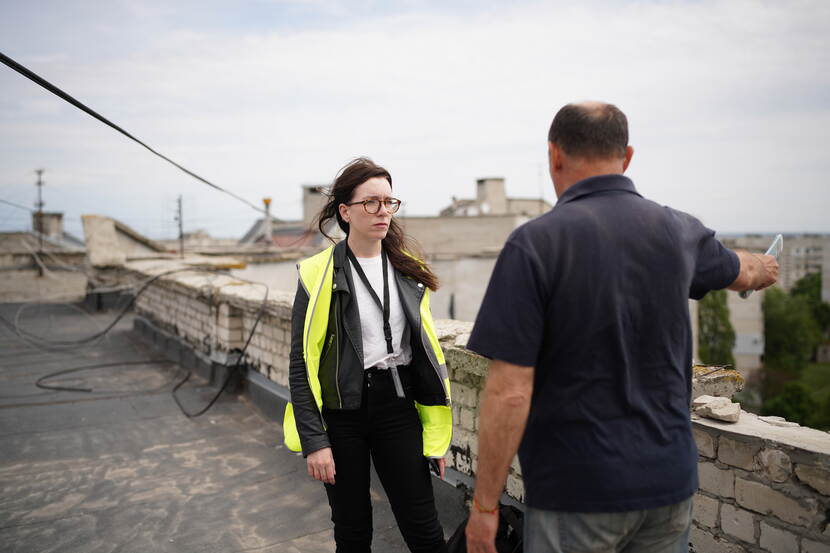War in Ukraine: ‘We can’t leave anyone behind’
Kharkiv, Ukraine’s second-largest city, is located less than 35 kilometres from the Russian border. The area was occupied by Russian forces for many months and sustained heavy damage. With the support of the Dutch embassy in Kyiv, international aid organisation Nonviolent Peaceforce is working in this region to protect civilians and aid workers. Kristina Preiksaityte and Nicolò Braggio spoke to us about their work.
Nonviolent Peaceforce does not supply material assistance but works instead to offer protection to civilians and aid workers. ‘We work with local aid organisations, volunteers and communities to enhance security in the region,’ says Kristina, who is from Lithuania. Before the war she worked at Nonviolent Peaceforce’s headquarters in Geneva, and since April 2022 she has been based in Ukraine.
Her Italian colleague Nicolò has been in Ukraine since autumn 2022, and coordinates the organisation’s activities in Kharkiv. ‘We have mobile teams to help people in locations that are difficult to reach and where international aid agencies have a limited presence,’ he says. ‘That includes recently liberated areas, such as Kharkiv.’
Bullet-proof vests and helmets
Local aid organisations and volunteers are playing a key role in Ukraine. They often have extensive local networks and a good knowledge of where aid is needed. But after ten months of war, many organisations are under severe pressure, Nicolò explains. ‘Many Ukrainians have been helping out for months, but this prevents them from earning a regular income. What’s more, it’s often local volunteers who work in the most dangerous areas, as the international aid organisations are prevented from going there by their own security protocols.’
Nonviolent Peaceforce supports these local aid agencies and volunteers. ‘We make sure they have what they need to do their work, and do it as safely as possible,’ Nicolò says. ‘In Kharkiv, for example, we work with an organisation that evacuates civilians from areas where fighting is still going on. We loan bullet-proof vests and helmets to our local partners, and we help plan the evacuation route and cover the costs – mainly for petrol – incurred by volunteers.’
Vulnerable groups
As well as supporting local organisations, Nonviolent Peaceforce also provides direct assistance to the Ukrainian people. ‘We visit communities and let people know where specific types of aid are available and how they can access it, especially in remote areas,’ Kristina explains. ‘Right now, most emergency aid is being provided in the big cities, but there’s no public transport and petrol is scarce. As a result, people who don’t live in the cities often have no access to the aid that’s available.’
People in these remote areas are often extra vulnerable, Nicolò adds. ‘The people who live here are often either very old or very young. And it’s particularly difficult for elderly people, young children or people with a disability to evacuate, collect aid packages or get to heated shelters.’ So the team in Kharkiv is also offering assistance outside the city. ‘Above all, we need to take care of the most vulnerable people. It may be just a drop in the ocean in such a big country with so many people in need, but we can’t leave anyone behind.’


Mines and explosives
Up until now, the project launched in Kharkiv in December has mainly focused on assisting local volunteer organisations in evacuations, and performing risk and needs assessments for the region. One of the biggest dangers, according to Nicolò, is unexploded ordnance. ‘People go into the forests and fields in search of firewood because there’s no electricity or gas, and they’re risking their lives in the process. These areas haven’t been cleared of mines yet; every day people are finding explosives in their homes, washing machines or even in children’s toys.’
Nonviolent Peaceforce wants to offer training courses to ensure that people know what to do if they encounter unexploded ordnance. ‘In these courses we can show people how to recognise mines and how to deal with any explosives they come across. We can also explain how to register the location of mines and notify the correct institutions,’ Nicolò says.
The organisation also plans to provide first-aid training. In Nicolò’s view, ‘It’s in the interest not only of the local community but also of the volunteers that people can help one another in this way.’
Mobile teams
According to Nicolò and Kristina, the mental health of the region’s residents is another major concern. ‘People have lived for months under occupation and are now dealing with constant shelling,’ says Kristina. ‘They’ve seen and experienced a great deal, and they’ve lost friends and family. This is taking its toll on people in the region, as well as on the volunteers.’
What’s more, many services that were previously available in Ukraine are no longer being offered. Local volunteers told Nicolò about a shelter for victims of domestic violence, for example. ‘Before the war, people could go to the shelter for help, but now it’s being used as a temporary reception centre for displaced people from elsewhere in Ukraine.’
Nonviolent Peaceforce is therefore working to set up mobile teams made up of two psychologists, a security officer and a driver. Nicolò is currently researching where these teams can be of most help in the region. ‘It’s important that people are listened to, that they know where they can get help, and that they can be referred where necessary to specialised services.’
‘Impressive to see how the country is pulling together’
All the work done by Nicolò and Kristina is rooted in their strong ties with the local community, organisations and volunteers. ‘We don’t want our protection services to fall apart as soon as we leave the region,’ says Nicolò. ‘So we’re partnering with local communities and training volunteers to ensure that this work can continue without us.’
Kristina and Nicolò have both been impressed by the people of Ukraine. ‘It really is a great privilege to work with these communities and volunteers. It’s so impressive to see how the entire country is pulling together and helping each other, making sure that aid is provided to those who need it the most.’
Dutch aid to UkraineThe Dutch embassy in Kyiv is supporting small, agile aid organisations, which are often able to respond swiftly, giving Ukrainians vital emergency assistance. Small NGOs and volunteer organisations are playing a key role in Ukraine: they often have an extensive local network and good knowledge of where aid is needed. In 2022 the embassy had a €250,000 fund with which to support these kinds of organisations, and the same amount has been allocated for 2023. Using this fund, the embassy financed four projects last year, including the activities of Nonviolence Peaceforce in Kharkiv. The fund is an important addition to the existing resources of the embassy and the international organisations that the Netherlands supports, such as the United Nations and the World Bank. Read more about Dutch aid for Ukraine:
|
Originally published at https://www.government.nl/latest/news/2023/02/13/war-in-ukraine-we-cant-leave-anyone-behind



